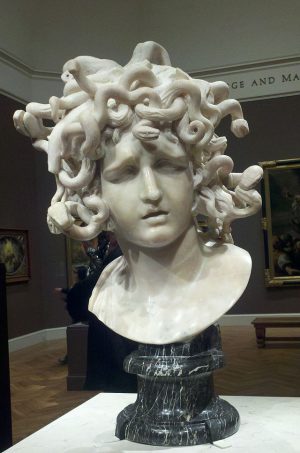Depending on whose version you hear, Medusa’s story goes something like this: Medusa was one of the most beautiful women on earth, so beautiful, in fact, that she caught the eye of Poseidon. Poseidon – one of the most powerful Olympians, who ruled over the land, the seas, over earthquakes and horses, the father of the Cyclopes. How lucky she was you might say, to be the attention of such a god. Her luck was that of most women in Greek mythology.
Medusa was the priestess of Athena, and one day, whilst worshipping in the temple of Athena, Poseidon sexually assaulted her. This defiled the sacred place of Athena, one of the virgin goddesses, and rightly so Athena was furious, vengeful. But it was not Poseidon who was punished, for he was one of the three brothers, he was the unchallengeable, mighty deity of the oceans and so it was Medusa who was punished for the sins of her attacker. Medusa was sentenced by Athena to be a Gorgon – hideous. A monster with snakes for hair and a gaze that would turn all to stone. Athena abandoned her priestess in favor of the goddesses’ uncle, Poseidon, because Gods do not face retribution, it the mortals that are punished. So Medusa was transformed and went to live on the island of Sarpedon (according to Hesiod), taking out her loneliness on travelers with whose petrified bodies she used to decorate her tomb. It was here she met her death by the sword of the hero Perseus, who used her severed head as a gifted weapon, for her deadly stare remained powerful even in death and it was from her severed head that Medusa’s two children sprang: Chrysaor and Pegasus (who was given to Perseus by Athena to save Andromeda).
In the story, Medusa is a monster meant to evoke fear in the bard’s audience. A lesson to all women of what beauty will do. A worthy beast for a hero to slay. But why? Why is it that Medusa is the monster that is slain? Why is she the one who is punished and not the God who assaulted her, who felt entitled to her body only by the fact that she was beautiful. How is it that he is not the monster? The victim is blamed, the victim faces the consequences. We ask why History is relevant, why Classical myths hold any value in today’s society. This, this is why. They hold a relevance to our society that reaches through all that time and speaks. The blaming of victims? The punishment of someone who was on the receiving end of hatred and oppression is a sight we see in a disgustingly common amount today. In this, society, for once does not discriminate because of gender. Male, female, transgender, nonbinary, genderfluid, people vilify victims no matter what. This society does not aid those who have been wronged, we question them. We doubt them and we shame them and we leave them to suffer the consequences in silence, but is that who Medusa was?
Medusa, was a mortal woman. She had no power before she was assaulted. Some may say that Athena took her, this priestess who had suffered at the hands of a powerful man and gave her a gift. She gave Medusa power. She gave Medusa a stare that would never allow anyone to touch her without her consent ever again. Oh, but she was made to be ugly? Ugly by whose standards? Because from where I’m sitting it sounds like that ugliness didn’t stem from her looks, from her hair, it stemmed from the fact that a woman was pushed down by a man and rose stronger – ready and prepared to do battle. Powerful women have been vilified for hundreds of years in western cultures; Medea, the Amazons, Circe to name but a few Classical examples. What happened to Cassandra when she said no to Apollo? She was cursed so that no one would ever believe the truth of her words. Sound familiar?
Medusa is, however, not about the way in which men viewed her. The story of Medusa is not about the opinions of misogynists, of oppressors and of assaulters. I think it is often forgotten that Medusa was also one of three, the mortal of three sisters and her epithet? “The ruler”. The story of Medusa is a celebration of power. Not just the power of women but of survivors in general. She became a symbol of Athene’s protection, her Libyan counterpart was worshipped and held resemblance to Ma’at one of the aspects of the triple goddess of Egypt – Neith. By men, she was represented comically, with bulging eyes and a leering mouth or defeated, on her side in cases of the Medusa plinths of Ancient Rome. In ancient Greek and Roman cultures, an almost morbid fascination with powerful woman seems to be a constant theme. They are barbarous, they are repellent, the villains of their stories who meet just ends. They do, however, appear nonetheless: in reliefs, in temple ornamentation, in written literature, in theatre, in pottery, in myth. The power of women, has always been there, a threat to men. But across the ages, Medusa has been a beacon of strength to women and to survivors. Robert Graves even suggests her name was the same as a Libyan queen, who lead her army into battle and was captured and beheaded. And now, Medusa’s head is used as a symbol in tattoo form to represent strength after trauma or the survival of sexual assault.

